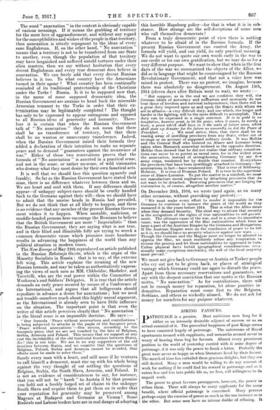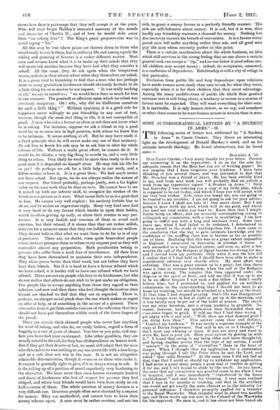ASKING FAVOURS.
PATRONAGE is a passion. Most ambitious men long for it either as an intensely desirable adjunct of success or as an actual essential of it. The proverbial happiness of past Kings seers to have consisted largely of patronage. The anterooms of Royal apartments teemed with suppliants, and monarchs seemed never to weary of hearing them beg for favours. Almost every prominent position in the world of yesterday carried with it some degree of patronage. if it was only the power to frank a letter. Probably the great were never so happy as when literature lived by their favour. The march of time has curtailed these gracious delights, but they are still desired. Many a man would be willing to do any amount of work for nothing if he could find his reward in patronage, and as it enters less and less into public life so, we fear, will willingness to do unpaid work.
The power to grant favours presupposes, however, the power to refuse them. There will always be many applicants for the same benefit, .where official patronage is concerned. Many persons perhaps enjoy the exercise of power as much in the one instance as in the other. But some men have an intense dislike of refusing. It
*thews how dear is patronage that they will aceept it at the price. Who will ever forget Halifax's immortal anatomy of the moods and character of Charles IL, and of how he would slide away from " an asking face" ? The King's great prepossession was to avoid saying " No."
All this may be true where prizes are thrown down to those who stand ready to catch them, but in ordinary life and among equals the asking and granting of favours is a rather different matter. Most men and women know what it is to make up their minds that they will never ask another because they have had what they consider a rebuff. All the same, they do ask again when the temptation recurs, and do in their return refuse when they themselves are asked. It is a. great trial to friendship to find that a man who has perhaps done us many gratuitous kindnesses should obviously hesitate to do a little thing for us in answer to our request. " It was really nothing at all," u we say to ourselves ; " we would have done as much for him in one moment. The goodwill or affection upon which we relied was obviously imaginary. Oh ! why, why did we disillusion ourselves for such a little thing ? " Without cynicism, it is a good rule for happiness never willingly to put friendship to any sort of test, because, though the most real thing in life, it is not susceptible of proof. A man who asks a favour as often as not does not know what he is asking. For instance, suppose we ask a friend to say a good word for us to some one in high position, with whom we know him to be intimate. It seems nothing at all. But he may have-made it a fixed principle that he will never make any use of that intimacy. To ask him to break his rule may be to ask him to alter his whole scheme of life. Without a really great effort, he cannot do it. It would be, he thinks, a very big thing to accede to, and a very little thing to refuse. Very likely he would be more than ready to do us a good turn if it depended on himself alone. He may risk his life for us yet ! Or perhaps we ask for a little help in our work, and a fellow-worker refuses it. It is a great blow. We had much better not have asked. But again, we do not always realize the nature of our request. Our friend probably, perhaps justly, sets a far higher value on his own work than he does on ours. He cannot bear to see it mixed up with our inferior stuff, to recognize his strokes of the brush in our picture as it were. What seems little to us is a good deal to him. He cannot very well explain : his modesty forbids him to do so, and he makes an ungracious reply. Many very kind men find it very hard to do any favour which breaks in upon their habits, which involves getting up early, or alters their routine in any par- ticular. It is very foolish and tiresome of them to avoid such exertion, but their refusal, if it shows that they are rather selfish, does not for a moment mean that they are indifferent to our welfare. They do not believe that what we want them to do for us is of any importance. There are, no doubt, some quite benevolent people whose instinct prompts them to refuse every request just as they will contradict almost any proposition. Both peculiarities belong to persons who suffer from a weak fear of interference. All their lives they have been determined to maintain their own independence. They often prove better than their word, but not before they have hurt their friends. But if it is hard to have a favour refused which we have asked, it is harder still to have one refused which we have offered. There are certain people who love to do kindnesses, but who do not realize that others do not wish to be put under an obligation. Few people like to accept anything from those they regard as their inferiors, and now and then those who had thought themselves their friends are shocked to find that they are so regarded. There is, perhaps, no sharper social pinch than the one which makes us regret an offer of help, or of something in the nature of a present. Those who suffer from it get little satisfaction out of the reflection that they should not have put themselves within reach of the fierce fingers of the proud.
There are certain thick-skinned people who never lose anything for want of asking, and who do, we verily believe, regard a form of begging as a sort of game of chance. You lose or you gain, and any- how you have had your excitement. Like other gamblers, they are usually ruined in the end, for they lose all dependence on honest work. But if they get their deserts at last., we must still admit that the man who determines to owe nothing to any one starts life with a handicap, and as a rule does not win in the race. It is not an altogether admirable determination, though it seems so to those who make it. It cannot be generally right to give, if it is always wrong to ask. It is the taking up of a position of moral superiority very hardening to the character. We have more than once known inveterate lenders and doers of kindnesses who lost all respect for persons they had obliged, and whose best friends would have been least ready to ask half-a-crown of them. The whole question of money favours is a very difficult one. Generous people often seem shocked by a request for money. They are methodical, and cannot bear to have their money scheme upset. A man must be rather careless, and not toe
rich, to grant a money favour in a perfectly friendly, manner. The rich are self-defensive about money. It is sad, but it is true, that hardly any friendship warrants a demand for money. Nothing but dire necessity excuses the breach of convention. It is a favour every proud man will suffer anything rather than ask; and all good men pity the man whom necessity pushes to this point.
There is a certain anachronism about the whole business, an idea which still survives in the strong feeling that no one above a certain general rank can accept a, " tip," and no one below it need refuse one. All children may accept money ; indeed, its acceptance, unearned, is a confession of dependence. Relationship is still a city of refuge in this particular.
Exclusion from public life and long dependence upon relations have made women more ready than men to ask for what they want, especially when it is for their children that they covet advantage. Among the many modifications of public life which their gradual entrance into it will bring about, a tendency to return to a system of favour must be expected. They will want everything for their sons. It is inevitable. It is only human nature, as we say, and .somehow or other there seems to be more human nature in women than in men.



























 Previous page
Previous page